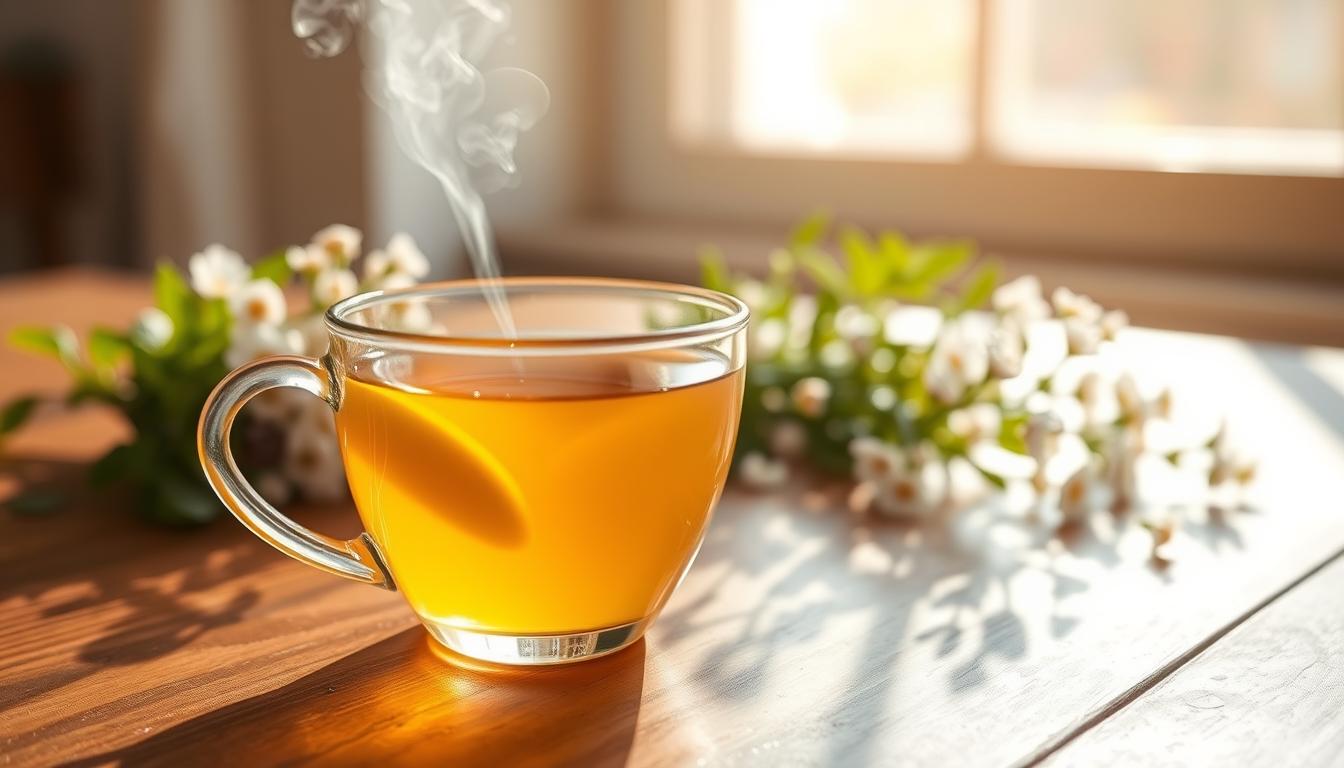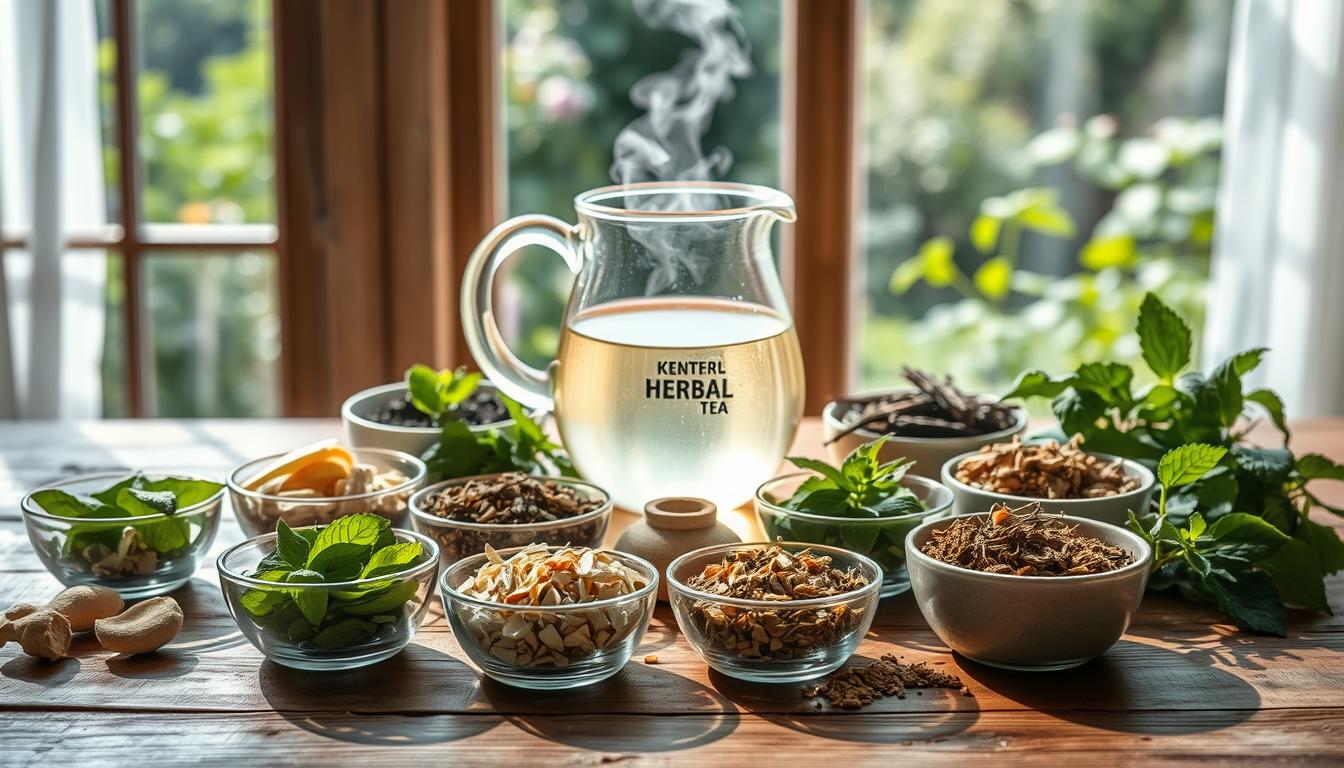Did you know that over 70% of pregnant women experience nausea during their first trimester? This common concern often leads expecting mothers to seek natural remedies, such as herbal teas. Among these, lemon ginger tea stands out as a popular choice due to its soothing properties.
This blend combines natural ingredients like lemon and ginger, both historically known for their ability to ease nausea. However, even though herbal teas are made from plant parts like roots or flowers, not all are considered safe for pregnant women. Experts recommend careful monitoring of ingredients to ensure they pose no risk to the mother or baby.
Clinical studies and healthcare professionals emphasize the importance of consulting a doctor before consuming any herbal tea. The effects can vary from one pregnant woman to another, making personalized advice essential. In the following sections, we’ll explore the benefits, potential risks, and best practices for enjoying this safe drink during pregnancy.
Key Takeaways
- Lemon ginger tea is a natural remedy often used to ease nausea.
- Herbal teas require caution during pregnancy due to varying effects.
- Consulting a doctor is crucial before consuming any herbal tea.
- Not all herbal teas are safe for pregnant women.
- Upcoming sections will cover benefits, risks, and best practices.
Introduction to Lemon Ginger Tea and Pregnancy
Herbal teas have been cherished for centuries for their natural healing properties. Unlike traditional teas, they are brewed from a variety of plant parts, including roots, berries, flowers, seeds, and leaves. This diversity in ingredients makes them a unique and versatile beverage choice.

Many people turn to herbal teas for their potential health benefits. Traditional use and modern research highlight their ability to soothe, energize, and support overall well-being. However, it’s essential to approach them with care, especially during pregnancy.
Overview of Herbal Teas
Herbal teas are not made from the tea plant but rather from a blend of natural ingredients. Each type offers distinct flavors and benefits, making them a popular choice for those seeking a caffeine-free alternative. From calming chamomile to invigorating peppermint, the options are endless.
Common Myths and Facts
There are many myths surrounding the use of herbal teas during pregnancy. Some believe that all natural products are inherently safe, but this isn’t always the case. Research from organizations like the American Pregnancy Association emphasizes the need for caution.
“While many herbal teas are safe in moderation, the concentration of ingredients can vary, leading to different effects on health.”
It’s crucial to verify health claims with reputable studies and consult a healthcare provider before making any changes to your diet. In the next sections, we’ll dive deeper into the benefits, risks, and best practices for enjoying herbal teas during this special time.
Understanding Herbal Teas and Their Role in Pregnancy
Herbal teas offer a natural way to support wellness, especially for expecting mothers. Unlike traditional teas, they are made by steeping various plant parts like roots, leaves, and flowers. This process extracts flavors and active compounds, creating a soothing and caffeine-free beverage.

How Herbal Teas Are Made
To make herbal tea, hot water is poured over plant parts like roots, leaves, or flowers. The heat helps release their natural flavors and medicinal properties. For example, ginger root is often used for its digestive benefits, while chamomile flowers are known for their calming effects.
Unlike black or green tea, most herbal teas do not contain caffeine. This makes them a popular choice for those looking to reduce their caffeine intake. However, it’s important to note that herbal teas are not regulated like pharmaceuticals, which can affect their quality and standardization.
General Safety Considerations
When choosing herbal teas, it’s essential to consider their ingredients. Some plant parts, like certain leaves or extracts, may not be suitable for everyone. For example, while peppermint leaf is generally safe, it may not be recommended for those with specific health conditions.
Healthcare professionals often advise pregnant women to avoid teas with strong medicinal properties unless approved by a doctor. This ensures that the tea complements their overall healthcare plan without posing risks.
| Tea Type | Caffeine Content |
|---|---|
| Black Tea | 40-70 mg per cup |
| Green Tea | 20-45 mg per cup |
| Herbal Tea | 0 mg per cup |
By understanding the differences between caffeine-containing teas and herbal infusions, expecting mothers can make informed choices. Always consult a healthcare provider to ensure the tea aligns with your specific needs.
is lemon ginger tea safe during pregnancy
Understanding the safety of herbal remedies is crucial for expecting mothers. When it comes to lemon ginger tea, expert opinions and research findings provide valuable insights. While this blend is often praised for its soothing properties, it’s essential to weigh the benefits against potential risks.
Expert Opinions and Research Findings
Research on herbal teas during pregnancy reveals mixed views. Factors like ingredient quality and individual responses play a significant role. According to the American Pregnancy Association, some herbal teas may pose risks if consumed in excess.
Experts highlight that certain ingredients in lemon ginger tea could affect blood properties or trigger uterine contractions. This underscores the importance of moderation and professional guidance. “The key is to balance the benefits with potential risks,” says a leading healthcare provider.
When to Consult Your Doctor
Consulting a healthcare provider is essential, especially if you’re taking medications. Some components in herbal teas might interact with prescribed drugs, leading to adverse effects. Additionally, unusual symptoms like dizziness or cramping should prompt immediate medical advice.
Individual reactions vary, and research findings can be inconclusive without professional input. Always rely on trusted studies and expert advice to make informed decisions. Remember, safety concerns often arise from improper dosage or non-commercial preparations.
Benefits of Lemon Ginger Tea for Expecting Mothers
Many expecting mothers seek natural solutions to common discomforts during pregnancy. One popular choice is a blend that combines the soothing properties of ginger with the refreshing taste of lemon. This drink not only helps ease symptoms but also supports overall well-being.
Relief from Nausea and Digestive Discomfort
Ginger, a key ingredient, is well-known for its anti-nausea properties. Research shows that consuming a measured amount of ginger can significantly reduce morning sickness. A cup of this blend in the morning can help manage nausea vomiting effectively.
Beyond nausea, ginger also aids digestion. It helps soothe the stomach and reduces bloating, making it a practical choice for pregnant women. Regular consumption, one day at a time, can provide consistent relief.
Immune System Support and Hydration
This herbal blend offers dual benefits. It supports hydration, which is crucial for both the mother and the developing baby. Staying hydrated helps maintain energy levels and supports overall health.
Additionally, ginger provides antioxidant support, bolstering the immune system. This is especially important during pregnancy when the body’s defenses may be lower. Combining these benefits makes this drink a valuable addition to a balanced diet.
“Moderation is key. While herbal teas can be beneficial, it’s essential to follow serving guidelines to avoid overpowering the system.”
Always consult a healthcare provider to ensure this drink aligns with your specific needs. By doing so, you can enjoy its benefits safely and effectively.
Potential Risks and Considerations
Expecting mothers often turn to herbal teas for comfort, but not all ingredients are risk-free. While many natural remedies are beneficial, some components can pose challenges during pregnancy. Understanding these risks is essential for making informed choices.
Ingredients to Watch Out For
Certain ingredients in herbal teas, like raspberry leaf, have raised concerns. Health professionals caution against consuming this plant in excess, especially during specific stages of pregnancy. While it’s often used to support uterine health, improper timing or dosage can lead to complications.
Other natural components may also trigger adverse reactions. For example, some plant extracts can cause increased vomiting or digestive discomfort. Always verify the safety of each ingredient with a trusted source or healthcare provider.
Risks Related to Overconsumption
Overindulging in herbal teas can lead to unintended consequences. Excessive intake of raspberry leaf or similar ingredients may affect the child’s development. This is particularly true during the first or third trimester, when the body is more sensitive.
Even natural ingredients can have significant effects if not used wisely. For instance, certain compounds in herbal teas might interfere with hormonal balance or trigger contractions. “Moderation and professional guidance are key,” advises a leading nutritionist.
| Ingredient | Potential Risk |
|---|---|
| Raspberry Leaf | May trigger contractions if overused |
| Peppermint | Can cause heartburn or reflux |
| Chamomile | May lead to allergic reactions |
Always consult a healthcare provider before incorporating herbal teas into your routine. This ensures that the benefits outweigh the risks, keeping both mother and child safe.
Tips for Safe Consumption and Best Practices
Making informed choices about herbal beverages can enhance wellness during pregnancy. To enjoy the benefits while minimizing risks, follow these practical guidelines.
Recommended Amounts and Frequency
Health experts suggest limiting intake to one or two cups per day. Steeping the blend for 3-5 minutes ensures optimal flavor and quality without over-extracting compounds. This approach supports moderation and reduces the risk of adverse effects.
Overconsumption may lead to discomfort or other symptoms. If you notice recurring issues like dizziness or cramping, consult your healthcare provider immediately. Monitoring your body’s response is key to safe consumption.
Pairing with a Balanced Diet
Herbal beverages work best when paired with wholesome food choices. Combining them with nutrient-rich meals boosts overall health and ensures a balanced diet. For example, enjoy a cup with a breakfast rich in fruits and whole grains.
Choosing high-quality products is equally important. Verify that the blend is free from harmful additives or contaminants. Not all food products meet the same standards, so always check labels and certifications.
“Moderation and careful selection are essential. Always prioritize products that align with your health needs.”
By following these tips, you can enjoy herbal beverages safely and effectively. Remember, moderation and professional guidance are your best allies during this special time.
Conclusion
When used correctly, herbal blends like lemon ginger can offer significant benefits for expecting mothers. Research and expert opinions highlight its potential to ease nausea and support digestion. However, attention to dosage and timing is critical to ensure safety for both the woman and the baby.
Consulting a doctor before incorporating any herbal remedy into your routine is essential. This step helps address individual health needs and minimizes risks. Personalized advice ensures that the blend complements your overall wellness plan without unintended effects.
When prepared and consumed in moderation, this drink is generally safe and can contribute positively to a woman’s health during pregnancy and around the time of birth. Staying informed and following professional guidance allows expecting mothers to make educated choices for their well-being.

